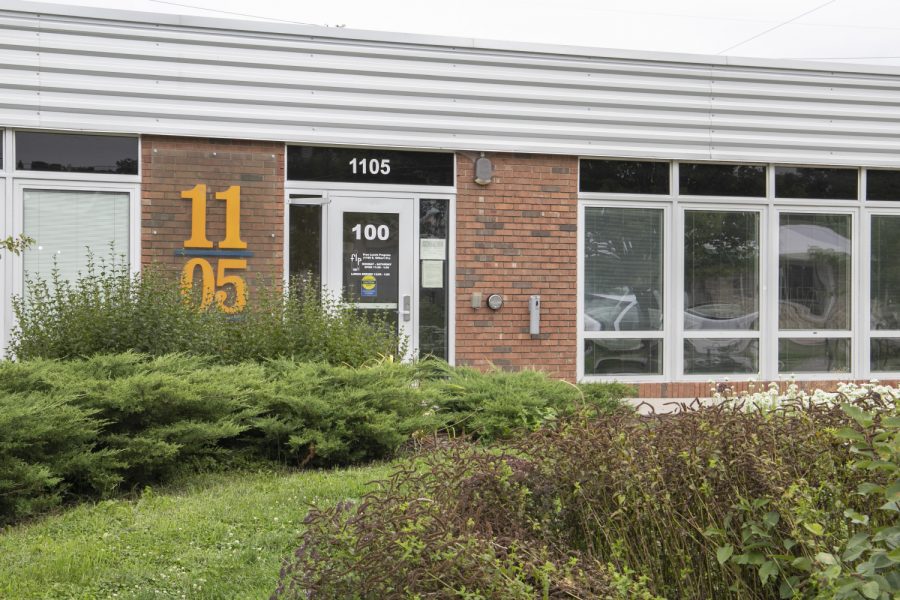Local advocates against domestic violence address COVID-19, social distancing
As concerns arise for victims of domestic abuse amid the novel-coronavirus outbreak and social-distancing guidelines, local organizations provide resources to those who could be in this situation, or things that the community can do to help them.
The Domestic Violence Intervention Program office is seen on Sunday, September 8, 2019.
March 30, 2020
As Iowans are urged to self-isolate in their homes amid community spread of the novel coronavirus, advocates against domestic and sexual violence are transitioning their services online, and some advocates have raised concerns that the need for such resources may be heightened with state recommendations to stay at home.
Martha Pierce, assistant director and violence-prevention program coordinator at the Women’s Resource and Action Center, said that the question of whether or not domestic violence will increase alongside the spread of COVID-19 does not have a simple answer. Because the virus is so unprecedented, she said, it may be some time before people find out how staying at home has affected domestic violence.“With what we’ve seen in the past with other crises, and things that keep us in our homes — though home is not safe for everyone — most survivors will do their best to make it through and maintain,” said Alta Medea-Peters, director of community engagement at the Domestic Violence Intervention Program.
Medea-Peters predicted that calls to the DVIP may begin to increase as the situation develops.In a Friday press conference, Detective Sgt. Brad Kunkel with the Johnson County Sheriff’s office said he wasn’t sure if there’d been an uptick in domestic violence cases in the area, but emphasized that DVIP is used as a resource, and that first responders will still come to a 911 call.
“It certainly still happens…It’s something we’re concerned about because there’s that real possibility — as people are home especially in an environment where they are with an abuser and they can’t leave now…” he said. “…If they are in an emergency situation, we are still here to respond.”
Rape Victim Advocacy Program Executive Director Adam Robinson said that many cases of sexual assault already go unreported, and COVID-19 will likely add additional barriers. As people avoid public spaces and hospitals, he said, forensic exams are less likely to be executed.
Leadership from each advocacy organization emphasized that they are still providing support for those who need it. Pierce added that the WRAC is currently in the process of moving their services online.
RELATED: Domestic Violence Intervention Program has brought safety and support to the community for 40 years
“WRAC is still providing 24-hour emergency advocacy and sheltering services and people can reach out to the domestic violence hotline at any time,” Pierce said.
The DVIP has transitioned to virtual and phone conferences with people who may require its services, Medea-Peters said, as opposed to in-person meetings. The organization is also taking donations of goods or funds from the community, Medea-Peters said.
“The DVIP has always had protocols in place for all kinds of situations,” Medea-Peters said. “We are equipped to sort of work with what we have and the resources available to us.”
Robinson said that RVAP is also in the process of transitioning to an almost entirely online service. The same services will continue to be provided, he said, but delivered by different methods. Non-emergencies are currently being handled over the phone, Robinson said, but emergencies are still handled by in-person contact. The RVAP is working to be as flexible as possible, he said.
Robinson emphasized the importance of checking in on loved ones amid the COVID-19 outbreak.
“I think, as always, sexual violence is never, ever the fault of the person that’s being harmed,” Robinson said. “Sometimes people that cause harm can gaslight — they can use threatening courses of action or language. That can be all consuming in this environment … services like the RVAP and others will be flexible and provide all the support they can.”
Medea-Peters said a major tactic used by abusers is maintaining control over their victims.“We want anyone in need to know that our services are here and we’re here to help them,” Medea-Peters said. “No one should feel isolated, alone, or unsafe.”
Resources:
Domestic Violence Intervention Program
- Hotline: 800.373.1043
- Website: https://dvipiowa.org/
Rape Victim Advocacy Program
- RVAP advocate 24-hour local crisis line: 319.335.6000 or 800.228.1625
- Iowa Sexual Abuse 24-hour hotline at 800.284.7821
- RVAP website: https://rvap.uiowa.edu/



